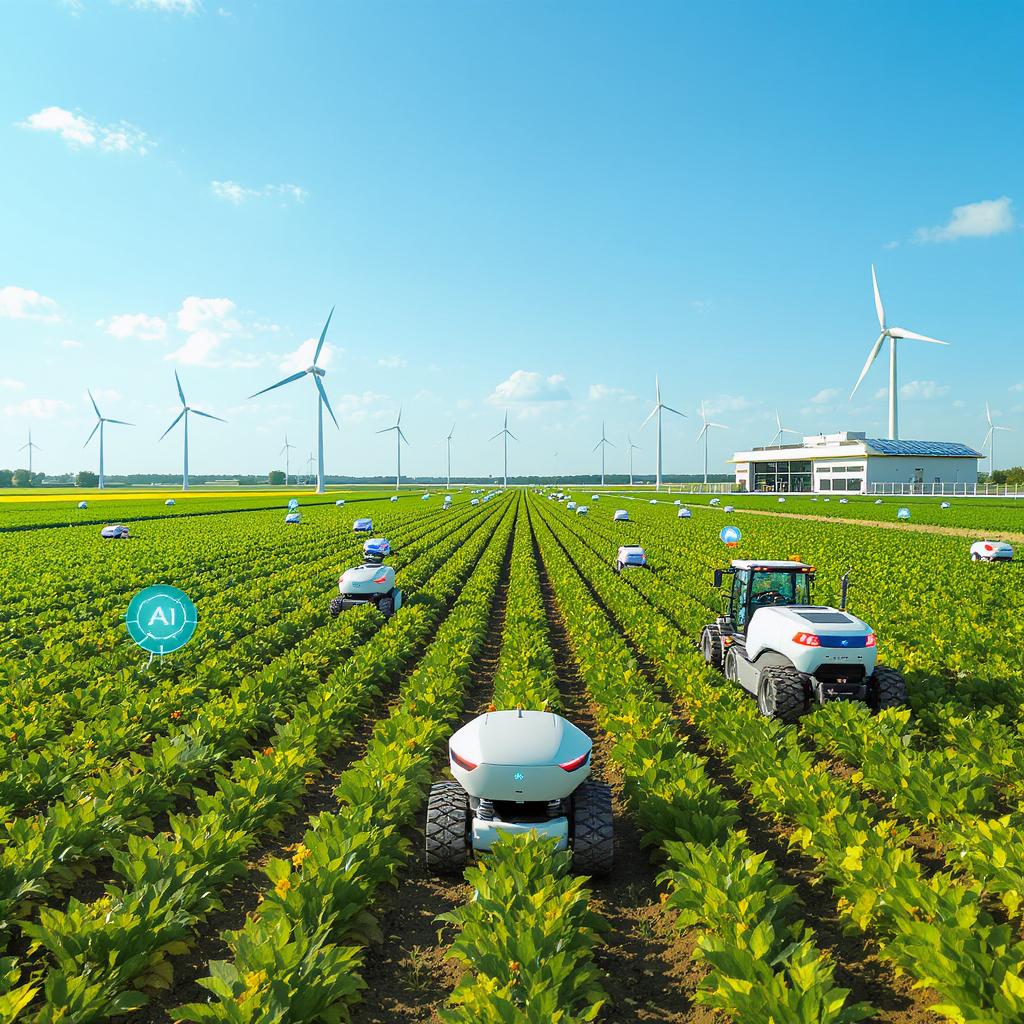Harnessing AI in Agriculture: Precision Farming, Autonomous Machinery, and Sustainable Practices

-
7/29/2025
As we step into a new era of agriculture, artificial intelligence emerges as a pivotal force transforming traditional practices. AI reshapes how we understand and manage agricultural operations, integrating technology into every aspect of farming life for enhanced efficiency and sustainability.
One of AI's most significant contributions lies in the realm of precision farming. Through cutting-edge algorithms and data analytics, AI empowers farmers to optimize resources with pinpoint accuracy.
- By analyzing soil conditions, weather patterns, and crop health, AI ensures that every decision made is tailored to the specific needs of the farm, reducing waste and boosting productivity.
- This targeted approach not only enhances yields but also conserves resources, highlighting AI's role as an ally in sustainable agriculture.
Further enhancing the agricultural landscape, AI provides invaluable data-driven insights that drive better decision-making. It collects and analyzes extensive datasets to offer predictive analytics, helping farmers anticipate challenges such as pest infestations or adverse weather conditions.
These AI innovations are supported by real-world applications and backed by noteworthy case studies.
- For instance, farms utilizing AI-powered drones can monitor crop health from above, quickly identifying issues that would otherwise go unnoticed.
- Meanwhile, AI-assisted irrigation systems adjust water delivery based on current crop requirements, ensuring moisture levels are optimally maintained without excess water usage.
Through these applications, AI not only underscores its transformative potential in the agricultural sector but also exemplifies its commitment to enhancing lives and promoting sustainability.
Precision farming, a cornerstone of modern agriculture, entails using AI technologies to manage farms at a micro level, optimizing resource usage and minimizing environmental impact. This method relies heavily on data-driven decisions to allocate resources like water, fertilizers, and pesticides where they're most needed, enhancing productivity and sustainability.
AI applications such as drones and sensors are pivotal in precision farming.
- Drones can swiftly fly over expansive fields, capturing high-resolution images that provide critical insights into crop health and soil conditions.
- Similarly, ground-based sensors continuously monitor soil moisture and nutrient levels, supplying real-time data that is essential for maintaining ideal growing conditions across the entire farm.
Beyond resource management, AI also excels in early pest and disease detection, safeguarding crops from devastating losses.
- Advanced machine learning algorithms analyze a plethora of data points, identifying pest patterns and signs of disease that might elude traditional observation.
- By diagnosing problems early, AI empowers farmers to address issues swiftly and precisely, curtailing harm to crops and reducing reliance on chemical treatments.
Turning the spotlight towards autonomous tractors and harvesters, these revolutionary machines are set to drastically cut back on manual labor in agriculture.
- One noteworthy aspect of AI in agriculture is its capability to enable machinery to adapt to varying field conditions.
- Examples from the field highlight the tangible benefits of these advancements.
Moreover, the precision and reliability of these machines lead to increased productivity. Automated systems work around the clock without breaks, maintaining consistent quality standards and significantly boosting overall output.
AI-powered irrigation systems mark a significant leap forward in farm management, leveraging real-time data to address the dynamic needs of crops effectively.
- The advantages of adapting these intelligent irrigation systems extend beyond immediate resource conservation.
- Moreover, the targeted water delivery facilitated by AI has proven to enhance crop yields markedly.
As AI continues to redefine the agricultural landscape, the ripple effects of intelligent irrigation systems are felt far and wide, steering farming toward a sustainable horizon.
In addition to transforming crop management, AI increasingly plays a pivotal role in monitoring animal health and behavior, providing vital support to livestock farmers.
- AI's potential in predicting breeding cycles is another area where it makes significant contributions.
- Optimizing feeding routines with AI further enhances livestock productivity.
AI’s strides in agriculture extend beyond crop and livestock management, infiltrating the economic and logistical facets of farming.
- Furthermore, AI plays a pivotal role in streamlining supply chain processes, addressing inefficiencies that traditionally led to losses.
- Examples from various industries underscore the transformative potential of AI.
Despite the promising potential of AI in agriculture, various barriers impede its widespread adoption, particularly among smaller farming communities.
- Another significant hurdle is the technical expertise required to effectively deploy and manage AI systems.
- To address these challenges, various initiatives and partnerships have emerged.
One shining example is the collaboration between tech firms and local agricultural groups to create AI platforms that do not demand extensive technical know-how.
Moreover, fostering an enduring support network comprising agronomists, AI technicians, and local communities strengthens the ecosystem farmers need to thrive in today's technologically enhanced agricultural landscape.
By breaking down the barriers to AI adoption through financial support, strategic partnerships, and continual education, we pave the way for farmers to participate actively in the digital transformation of agriculture.
